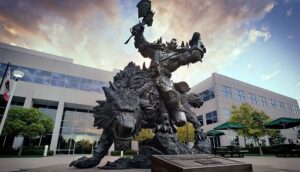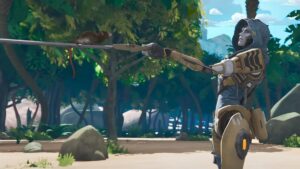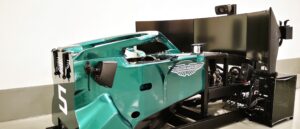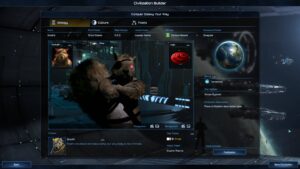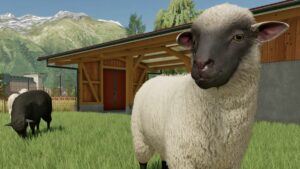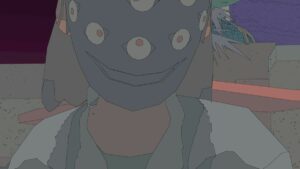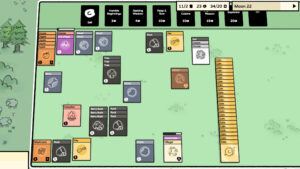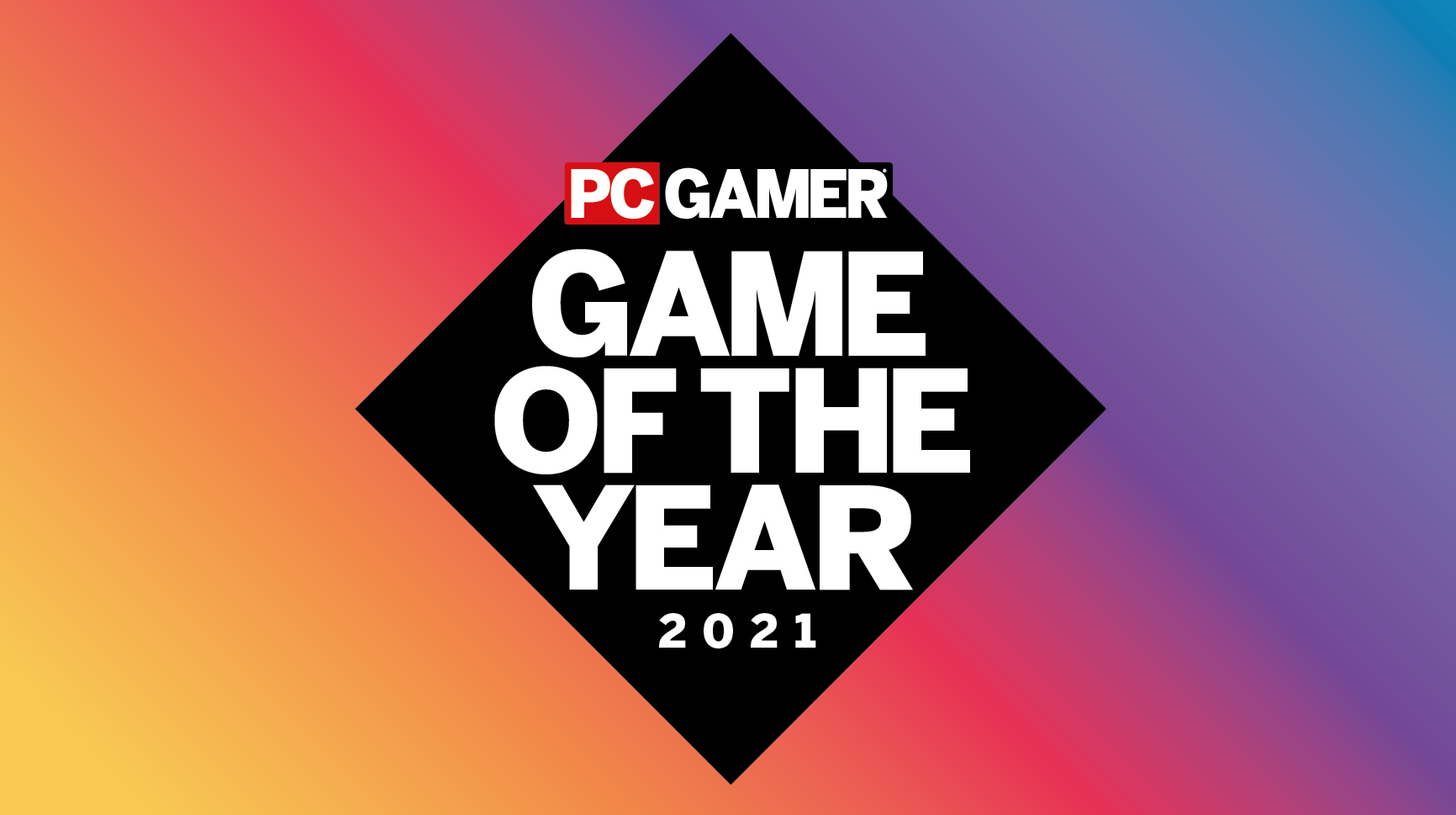
In addition to our main Game of the Year Awards 2021, each member of the PC Gamer team is shining a spotlight on a game they loved this year. We'll post new staff picks, alongside our main awards, throughout the rest of the month.
Header image courtesy of @raevpet. Go Pies.
Earlier this year, I planned to write about the complexities of Blaseball's Expansion Era. If you've not been following the simulated sport, you perhaps still heard the occasional tale of wild systemic shenanigans—the time the league's fans collaborated to do necromancy, or the cruel whims of a malevolent peanut god. These were the stories of the Discipline Era—a simpler time, where the collision of storytelling and simulation could be more easily encapsulated in a few short sentences.
The Expansion Era was different. It transformed Blaseball from a mostly passive experience into a massively co-operative strategy game that weaponised on-the-nose satire about modern sports fandom and franchises. Fans got stadiums to build and expand. Teams developed eDensity—a sort of collective sum of achievements and upgrades expressed as a weight that could cause them to sink. The heaviest teams were attacked by Consumers, who were both sharks and a metaphor.
And that was just the first few seasons.
I never finished my planned article for three reasons. 1) Too many things were happening, many of them necessitating entire research papers to explain. 2) Those things (of which there were too many) kept changing each week, meaning anything I wrote would be rendered almost instantly outdated. 3) It ultimately didn't matter because, while interesting to untangle, the high-level systemic weirdness of Blaseball isn't really the point. What happens on a mechanical level is less relevant than what is happening to a team and its players, and how their fans and the wider community react.
To memorialise the Expansion Era, then, here are three stories about my team, the Philly Pies.
The Gang Gets Cheated Out of a Championship
To understand the Philly Pies, you need to understand their history. The Pies won the first two seasons of Blaseball, and—in part thanks to a Discipline Era rule that said the first team to win three championships would “ascend”—became obsessed with earning their third ring. To date, it hasn't happened. Ascension is no longer on the table—The Baltimore Crabs did it back in the Discipline Era—but the Pies are still focused on securing the third ship.
This era, they came heartbreakingly close. Through the use of Wills—a type of vote that lets teams improve players, make roster changes and even plunder players from other teams—the Pies created a monster.
Season 17. By placing star pitcher Elvis Figuerora directly after Nerd Pacheco—who was, at the time, trapped in a peanut shell and thus unable to play—we exploited a, er, feature of the simulation that caused Figuerora to pitch twice in a row. With our best player starting twice as many games, the Pies had achieved a lifelong goal of fixing its pitching. It worked. Thanks to Elvis's 2.09 ERA, the Pies finished the season with a 68-31 record—good for second best in the league, and easily enough to secure a playoff spot.
season 17 mild high. back on top, baybee pic.twitter.com/ltXU6tXhBjApril 23, 2021
Unfortunately, pitching is only one half of the equation. Thanks to the Wills system, and the fine degree of control it gave to a team's fans to tweak rosters, all teams were continuously improving—at least those that didn't experience a disastrous election. And even if the sim favoured pitching at the time, it didn't matter if a team's bats didn't show up. In the Mild League Championship Series, facing down the formidable lineup of the Hawai'i Fridays, the Pies offense was nowhere to be seen. Our playoffs were over.
Season 18. Everything is in place. With our pitching still fixed, the season 17 elections were focused on improving our batting. We lucked out: Lead-off hitter and headcanon team captain Eduardo Woodman got a huge boost to his offensive stats, and the Pies gained a blood transfusion—receiving the teamwide modifier of AA Blood, which caused players to have a chance to play better if they hit a double. Which they did a lot. We finished the season with a 80-19 record—one of the best in the league's history.
Early in the season Nerd Pacheco was unpecked from their peanut shell during a game played in Birds weather. This meant the end of the Elvis double pitching bug, but it didn't matter. Nerd was also a good pitcher, so we seemed unstoppable.
On day 107, in a playoff game against the Baltimore Crabs in Peanut weather, Nerd Pacheco swallowed a stray peanut. Due to their time spent trapped in a peanut shell, they had previously gained the “Superallergic” modifier. They had a superallergic reaction, reducing their stats to effectively zero. This had never happened before.
You could spin a tale that this was the disastrous moment that ensured our tragic exit from the playoffs. But one bad pitcher can't lose a series. It didn't help, but ultimately the Pies choked. Again. Frequently, when the emotion of sports becomes too much, the always rambunctious Pies fans—aka, flans—will start spamming Discord chat with increasingly frenzied and bastardised versions of an already nonsense meme. “WHY DO THEY CALL IT THE OVEN?/WHEN YOU OF IN THE COLD FOOD OF OUT HOT EAT THE FOOD.” I love this team very much.
Season 19. Fuck.
In retrospect, I'm bitter about season 19. At the time, though, it was pretty chill. In the season 18 elections, the league's fans voted to enact Turntables. I won't go into the mechanics of this, but here is the upshot: winning became losing. If you scored more runs than your opponent, you would receive an “Unwin.” The Pies' record for the season was 75-24. As a result, they finished bottom of the league.
#BLASEBALLUPDATE:We can now confirm reports that Unwins are… negative Wins. pic.twitter.com/T9JAAjzrxCMay 17, 2021
Doing badly is not necessarily a bad thing in Blaseball. Once a team is mathematically eliminated from the postseason, they enter Enhanced Party Time, where players have the chance to earn stat boosts during their remaining matches. We thought this would result in the league's best team getting better, and for the most part, enjoyed the vibes. We were wrong. The Pies partied once, and the player that partied—Elvis Figueroa—was traded away due to some unlucky RNG in the end-of-season elections. Our best days were spent winning our way to defeat, and in season 20—when winning once again became winning—we returned a shadow of our former selves. These three seasons were the best the Pies had ever been, and we had nothing to show for it.
The Gang Saves a Beloved Player
During the season 19 elections, Canada Moist Talkers player Jesús Koch was gifted a new item—the Legendary Super Roamin' Fifth Base. This mysterious bit of loot gave them the Super Roamin' modifier, meaning they would travel to a new team at the end of each in-game week (nine hours in real time, don't ask). They would spend the early part of season 20 wandering the league—even playing with the Pies for a short while.
On day 38 they were playing against the Pies, in the lineup of Yellowstone Magic, our frequent—but friendly—rivals. In the fifth inning, Koch placed and subsequently stole the fifth base, dropping their item and installing it in the Pies stadium, The Oven, as a modifier. This had never happened before.
The fifth base had made an appearance in previous seasons—it forces players to pass through it before they reach home—but never like this. We were already processing a season in which we were doing significantly worse than before, and now our stadium, which we'd spent weeks turning into a park that would complement our high-scoring playstyle, had an extra base. We spent the next hours and days debating what this meant, unaware that we were sitting on a time bomb.
Season 21, day 17. In the second inning, Charleston Shoe Thieves player Richardson Games stole to the fifth base. And then they picked it up, gaining the Super Roamin' modifier. Three innings later, they stole fifth again, placing it back in the stadium. And so the trap of the Super Roamin' Fifth Base was revealed: It wasn't a permanent installation. If a player stole it, they stole it, and in doing so gained the modifier that caused them to leave the team. And do you know which team's players play in The Oven more than any other? The Pies.
The fans were on alert, waiting to see who would ultimately pick up the Fifth Base and carry it away.
Season 21, day 52. In the bottom of the 8th, Ruslan Greatness steals fifth base, and in doing so steals the Fifth Base. This is, arguably, the worst case scenario. Pies fans are not, it has to be said, one of the more sentimental fanbases in the league. Their focus is on winning, and so across their history there have been times the fans have actively rooted for a bad player to be incinerated. But Ruslan—himself once a bad player—was different. He's been with the Pies since the beginning. He's the product of the Pies election strategy, slowly developed from a terrible pitcher into one of the team's best hitters. His fan lore is delightful. And now, already close to the end of the Blaseball week, he was just two games away from roaming away.
NO!!!!! PUT IT DOWN!!!!!! pic.twitter.com/AY02wdk1BnJune 23, 2021
One of the most consistently impressive things about Pies fans is their voting discipline. It's how an otherwise small fanbase manages to stay competitive in a league that contains significantly larger voting blocs. Watching the fans mobilise to save Ruslan was a thing of beauty. As Ruslan was still currently on our team, we were free to cast votes to move him to another position. At the end of the season, even if Ruslan roamed away, the move—should it be picked in the RNG roulette of elections—would still be applied, effectively returning him back to the team. It was a gamble: Not only was there a chance the Will wouldn't be picked, but we also were banking on Ruslan dropping the item before the end of the season—otherwise, he'd just leave again.
First, though, we waited. This would require a significant investment of votes—a big chunk of the fans' collective economy for the season, on a “move” that would do nothing for the team except preserve the status quo. Another quirk of the Super Roamin' Fifth Base is it enhances a player's basethirst—the stat that defines how often they'll attempt to steal. There was a high chance Ruslan would simply put the item back, just like Richardson Games had earlier in the season.
Season 21, day 53. Ruslan didn't drop the item.
Season 21, day 54. At the end of this game, Ruslan would leave. Still, we hoped he would drop it and save us an expensive rescue. We waited. And waited. At the bottom of the seventh, two ground outs and a flyout saw the Pies dispatched without a single player getting on base. The call was made, and many hundreds of thousands of votes were cast. Our election plans were ruined, but it would be worth it to save one of our best and oldest players.
At the bottom of the eighth, Ruslan hit a single. Moments later, he stole fifth base and dropped the item. You have to laugh.
The Gang Implodes the Universe
The latter seasons of the era were mostly defined by plot and introduced features such as: What if a home run was bad. Blaseball was increasingly becoming an unsatisfying sport to watch—deliberately, such was the story The Game Band was telling.
The Pies were also suffering a string of bad election luck—our mid-era string of dominance attracting the ire of a handful of bad actors dumping votes into things that went against the fans' stated plans. As a result, in season 23, we were awarded the modifier Avoidance. This was bad for two reasons. 1) Avoidance stops a team from swinging at a ball if they've scored nine runs. The Pies fans like it when the numbers get bigger, and this put a hard cap on that. 2) We, like most teams in the league, were aiming for the Roamless modifier. This stopped players from roaming to your team, which was good because the league was about to suffer the wrath of Parker MacMillen, a Super Roamin' player who, when he left, would leave behind an instability modifier that threatened to incinerate the entire team.
As one of the few teams without Roamless, The Pies become one of the few teams Parker could roam to. And he did, multiple times. Each time we prepared for the worst: an Eclipse weather game with the instability modifier, massively increasing our chances of being burned out of existence. The Pie's team motto—Pie or Die—took on new meaning, and throughout the season Pies fans would chant “I CHOOSE PIE” throughout the Blaseball Discord's channels.
Ultimately, the Pies didn't burn, but Parker's repeated visit did distract us from the true question: Why was there even a modifier that stopped us reaching 10 runs?
#BLASEBALLUPDATE: The new Navigate tab shows a map. pic.twitter.com/vwvQuR1ZwBJuly 27, 2021
As the end-of-era plot progressed throughout the season, teams eventually set sail across a map of Blaseball's cosmology—using votes to steer to one of four corners, each represented by a cosmic force. In a fit of what could be seen as nihilism, but was actually a good faith attempt to “win” what was looking like an increasingly unwinnable season, the Pies set sail for a Black Hole. This supercharged Black Hole had been swallowing the league's rules throughout the season—whenever a team scored ten runs in Black Hole weather. We didn't like most of the league's rules—they were, after all, the reason we lost season 19. And surely we couldn't even score ten runs if we stopped swinging the bat at nine.
Season 24, day 79. The Pies are home against the Yellowstone Magic, losing 6-4. In the bottom of the fourth, Jefferson Delacruz hits a three-run home run for the Pies. But he scores six runs, because Magic has the Magnified modifier that doubles any runs scored for or against them. The Pies, despite the odds, score 10. In Black Hole weather.
The Pies collected 10!
Black Hole (Black Hole) became Agitated.
Black Hole (Black Hole) nullified the Pies!
This had never happened before.
#BLASEBALLUPDATE:The Pies have been Nullified. pic.twitter.com/k1iMZjfZmPJuly 30, 2021
With no team to play, the Magic win by forfeit. The Pies, meanwhile, ceased to exist—all reference to them deleted from the website. All that remained was a question mark—a {nullteam}—that had broken free from the bounds of the map. In the days that followed, the Black Hole grew, swallowing every team that hadn't reached a corner of the map, and, ultimately, Blaseball's universe itself. It was the end of the era, and after it was all done, all that was left was a note promising that the Pies—and the other 23 teams of the League—would return.
In telling these stories, I'm not suggesting that the Pies are in any way remarkable. They are a team with a community and culture that happens to align with how I view sports, and in that sense they're the right team for me. But every fan for every team will have similar moments: when their team was embroiled in the drama of the moment—the successes and the defeats; the tragedies and the triumphs. Many teams fared much better, and many suffered much worse.
This isn't even an exhaustive history of the Pies: I've not mentioned their affinity for birds, the time when the phrase “The Pies placed a Fax Machine in The Oven” became a league-wide meme, the pitcher who gained a vampiric jacket, or the frenetic chant we spam whenever star player Jaxon Buckly hits a home run. That's the beauty of sport, even a fake sport full of silly rules based on cringe-inducing puns: Each team is rich with its own stories that form the tapestry of something much bigger. It would be impossible to tell the story of Blaseball from any other perspective; it's both too big and too personal.
Blaseball's third era has yet to begin. Instead, The Game Band is running a series of short-form experiments featuring alternate universe versions of the core teams, with new players and new rules each time. I haven't been back, because I'm not as invested in a version of the team without the shared history its fans have created over the 24 seasons of the past two eras. But when the third era kicks off, I'll be there, in the Discord, ready to finally win that third championship.
- "
- 107
- Aiming
- All
- article
- attracting
- baltimore
- Banking
- BAT
- bats
- Beauty
- BEST
- Bit
- Black
- blood
- bomb
- Bug
- build
- call
- Canada
- case
- Cause
- caused
- chances
- channels
- community
- Competitive
- Consumers
- credit
- Culture
- day
- despite
- developed
- DID
- discord
- Drama
- Drop
- dropped
- Early
- Earning
- eat
- economy
- Election
- Elections
- Exit
- Expand
- expansion
- expensive
- experience
- facing
- fake
- Features
- Finally
- fine
- First
- fit
- Focus
- food
- form
- Franchises
- Free
- full
- future
- game
- Games
- Gang
- good
- here
- High
- history
- Home
- How
- HTTPS
- huge
- Hundreds
- i
- image
- improve
- investment
- IT
- laugh
- Legendary
- Level
- love
- machine
- map
- Mechanics
- meme
- Modern
- move
- numbers
- Other
- oven
- PC
- peanut
- perspective
- pitching
- play
- player
- players
- Playing
- Product
- RE
- React
- reaction
- reasons
- record
- Reports
- research
- REST
- Revealed
- Ring
- rng
- Roulette
- rules
- Run
- running
- s
- satire
- sense
- Series
- set
- Shadow
- shared
- Shell
- Short
- SIM
- simulation
- SIX
- small
- So
- spam
- spend
- Spin
- Sport
- Sports
- Spot
- Spotlight
- start
- stats
- Status
- stay
- stole
- Stories
- Story
- storytelling
- Strategy
- system
- tactical
- The
- time
- top
- travel
- upgrades
- us
- View
- Vote
- votes
- Voting
- Website
- week
- What
- What is
- WHO
- Wider Community
- win
- winning
- worth
- year
- zero


